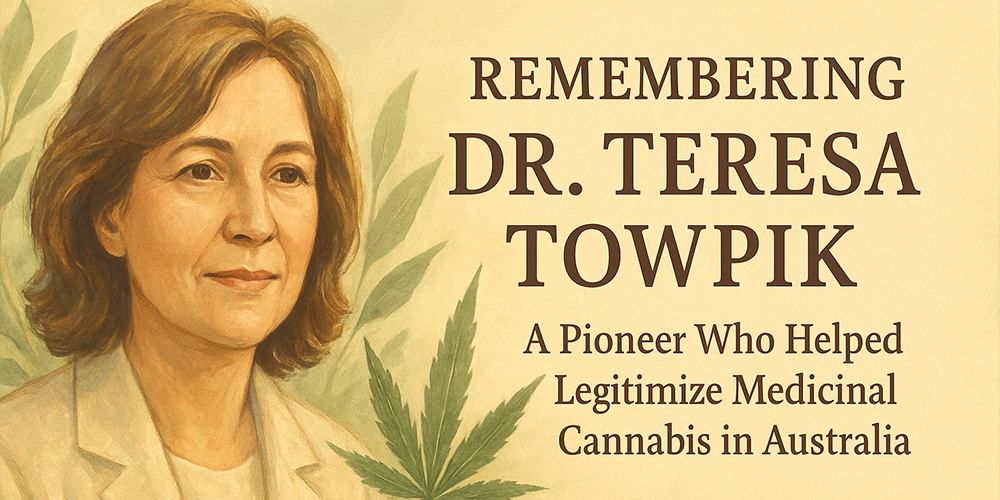
Home » Remembering Dr. Teresa Towpik: A Pioneer Who Helped Legitimize Medicinal Cannabis in Australia
Remembering Dr. Teresa Towpik: A Pioneer Who Helped Legitimize Medicinal Cannabis in Australia
Australia’s cannabis industry is today reflecting on the remarkable life and legacy of Dr. Teresa Towpik, who passed away this week after a long battle with cancer. As co-founder of Medihuanna and one of the country’s earliest and most outspoken advocates for medicinal cannabis, Dr. Towpik leaves behind a profound legacy that transformed both policy and perception around cannabis in Australia.
A Doctor Ahead of Her Time
Long before cannabis became part of mainstream medical discussions, Dr. Teresa Towpik was advocating for its therapeutic benefits. As a practicing general practitioner in Sydney, she was among the first Australian doctors to openly speak about the limitations of conventional medicine and the untapped potential of cannabis as a treatment for chronic pain, epilepsy, multiple sclerosis, and cancer-related symptoms.
In 2016, when Australia passed laws legalizing medicinal cannabis under prescription, Dr. Towpik immediately positioned herself at the forefront of this emerging field. She co-founded Medihuanna, an education platform designed to train medical professionals on cannabis prescribing, patient safety, and evidence-based use. Her work was instrumental in bridging the gap between patients seeking relief and doctors hesitant to engage with cannabis therapies due to stigma and lack of knowledge.

Medihuanna: Shaping Clinical Cannabis Education
Through Medihuanna, Dr. Towpik helped normalize cannabis medicine in the clinical environment. Thousands of health professionals, from GPs to specialists, engaged with her courses. Her teaching emphasized not only pharmacology and dosage, but also compassion and patient-centered care—values she believed were essential in cannabis medicine.
Colleagues describe her as an educator who challenged doctors to keep an open mind and to prioritize patients’ lived experiences. “Teresa’s work gave legitimacy to cannabis as medicine in Australia,” said one industry leader. “She made it possible for doctors to learn, question, and ultimately prescribe with confidence.”
Breaking Stigma and Building Trust
One of Dr. Towpik’s greatest contributions was her relentless fight against stigma. At a time when cannabis was still strongly associated with recreational use and criminality, she took the professional risk of publicly attaching her medical credentials to its advocacy.
In interviews and conferences, she frequently told her own story as a cancer patient, explaining how cannabis supported her journey. This personal testimony gave her voice both authority and authenticity, resonating deeply with patients and professionals alike.
She often argued that access to medicinal cannabis was a human rights issue, particularly for patients with treatment-resistant conditions. Her compassion-driven message helped shift public opinion and laid the foundation for wider acceptance of cannabis in mainstream healthcare.
A Lasting Impact on Policy and Industry
While Dr. Towpik was not a politician, her influence extended into the policy arena. She advised lawmakers, provided expert testimony, and worked alongside advocacy groups pushing for more patient-friendly regulations. Her perspective was crucial in framing cannabis not as a threat, but as a legitimate medical tool requiring thoughtful regulation.
Her efforts also influenced the commercial cannabis sector in Australia. By creating an environment where clinicians felt more comfortable prescribing, she indirectly expanded the market for licensed cannabis producers and distributors. Today, Australia’s medicinal cannabis industry serves over 300,000 patients—a reality that would not have been possible without pioneers like Dr. Towpik.
The Human Side of a Medical Advocate
Beyond her professional achievements, Dr. Towpik is remembered for her warmth, humility, and deep empathy. Industry peers describe her as approachable and generous with her time, often mentoring young doctors entering the field of cannabis medicine.
Her own battle with cancer shaped her outlook and gave her an acute understanding of patients’ needs. She never positioned herself as a distant authority figure, but rather as a partner in healing, standing alongside patients in their search for relief.
Looking Ahead: Continuing Dr. Towpik’s Work
As Australia mourns her passing, many in the industry are also asking what comes next. Her death underscores the importance of continuing to expand medical education, reduce stigma, and make cannabis more accessible for patients in need.
Already, several organizations have announced plans to honor her legacy through research grants, educational scholarships, and conferences dedicated to cannabis medicine. There is also renewed discussion about creating a national framework to streamline patient access, a cause that Dr. Towpik consistently championed.
Her story also highlights the broader cultural shift happening in Australia: cannabis is no longer seen solely as a countercultural symbol, but as a legitimate, patient-centered medicine. That shift, in large part, is thanks to her.


2 Responses
It’s really a great and helpful piece of information. I am glad that you shared this helpful information with us. Please keep us informed like this. Thanks for sharing.
Quick observation– “references”could be incorrect. Thought you might quickly verify with spellperfect.com.
Cheers,
Jack